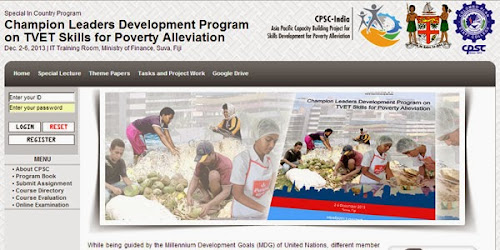Date : Dec. 16-20, 2013 /
Venue : NITTTR, Bhopal, India /
Program Type: Special In-Country Program /
Collaborating Organization: National Institute of Technical Teachers Training & Research, Bhopal, India /
Training Modules and Main Contents
There are altogether three modules, which are described in detail with objectives, approaches and contents.
- Promoting TVET Skills for Poverty Alleviation
- Generic Skills for Employability
- Stimulating Technical & Social entrepreneurship skills for Poverty alleviation
The delivery of the program design follows a spiral learning approach, beginning with an overview of core concepts and followed by progressively deeper application of the concepts and finally a self-directed learning approach through action planning.
Module 1: Promoting TVET Skills for Poverty Alleviation
- Modular Employable TVET Skills in Skills for Poverty Alleviation
- Current initiatives & innovative practices for Poverty Alleviation
- TVET Skills for Poverty Alleviation : conceptual frameworks and initiatives
- Methodology of identification of major TVET skills intervention for Poverty Alleviation
- Designing TVET skills Modular Program and Instructional Material
Module 2: Generic Skills Development for Employability
- Identification of major generic skills intervention for Employability
- Designing learning experiences and instructional material for generic skills development
- Higher order thinking skills (adapting to change, problem-solving, creativity, decision-making, learning how to learn)
- Interpersonal and team skills (communication, co-operation, negotiation/conflict resolution, leadership, and dealing with diversity)
Module 3: Stimulating Social Entrepreneurship Skills for Poverty Alleviation
- Key perspectives on poverty alleviation through social entrepreneurship
- Business planning and budgeting
- Challenges and issues in promoting entrepreneurship
- Identification of areas for technical and social entrepreneurship in service sector
- Best action models and practices for poverty alleviation
Expected Outcome
- Emergent approaches for integrating TVET Skills for Poverty and Youth Unemployment alleviation
- Action plan with a special vision for the SDPA project in TVET Sector



















